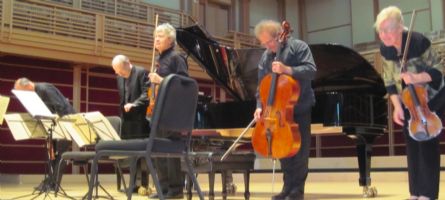|
Symphony
FROM THE NEW WORLD TO THE OLD WORLD
by Peter Lert
Saturday, June 14, 2025
Chamber
MC2 DUO RECITAL CLOSES 222'S SEASON
by Terry McNeill
Saturday, June 14, 2025
Choral and Vocal
CANTIAMO SONOMA'S LUSCIOUS A CAPELLA SINGING IN SEASON ENDING CONCERT
by Pamela Hicks Gailey
Sunday, June 8, 2025
Symphony
SRS SEASON ENDS WITH RESOUNDING TA-TA-TA-BANG
by Terry McNeill
Sunday, June 1, 2025
Symphony
YOUTHFUL VIRTUOSITY ON DISPLAY AT USO'S MAY CONCERTS
by Peter Lert
Saturday, May 17, 2025
Symphony
MYSTICAL PLANETS AND LIVELY GERSHWIN ORTIZ AT FINAL SRS CONCERT
by Peter Lert
Sunday, May 4, 2025
Symphony
VSO'S CONCERT MUSIC OF TIME, MUSIC OF PLACE
by Peter Lert
Sunday, April 27, 2025
VOCAL ELEGANCE AND FIRE AT THE 222'S RECITAL APRIL 26
by Pamela Hicks Gailey
Saturday, April 26, 2025
CANTIAMO SONOMA SINGS AN INSPIRED GOOD FRIDAY MOZART REQUIEM CONCERT
by Pamela Hicks Gailey
Friday, April 18, 2025
DRAMATIC SHOSTAKOVICH SYMPHONY CLOSES PHILHARMONIC'S 25TH SEASON
by Terry McNeill
Sunday, April 13, 2025
|
 |
 Marc-Andre Hamelin (2nd from Left) and the Takács SQ Feb. 25 |
BEETHOVEN'S MAJESTY IN TAKACS QUARTET CONCERT
by Terry McNeill
Sunday, February 25, 2018
Greatness in a single musical composition carried the day Feb. 25 when the Takács String Quartet played Beethoven in Weill Hall.
Sweeping aside two first half pieces, the Takács tackled Beethoven’s penultimate Quartet, the monumental C-Sharp Minor, Op. 131, written in 1826. From the first notes (adagio, and fugue) from violinist Edward Dusinberre it was clear that a magisterial experience would unfold. In six movements, played without break, a set of curiously formed variations supports a theme which seems to finally “congeal.” The Takács played extended soft passages beautifully, spiced by three and five-note outbursts by cellist András Fejér.
Hallmarks of quartet virtuosity were everywhere in the 31-minute piece: clean attacks and releases, naturally shaped phrasing, chaste ensemble, tempos that paired perfectly with the music, pizzicato in three instruments mixed exactly with a lush theme in the first violin. An example of Takác’s mastery of control came at the end of the demanding E Major presto (section five) where in the final chord repeats two were played legato with a diminuendo, and the third dry and almost silent. Masterful.
The lied phrase leading to the victorious allegro finale was profoundly beautiful. The Takács eloquent performance fixed as always Beethoven as the creator.
Weber’s Langsamer Satz quartet movement opened the concert, a luminous nine-minute farewell by the Viennese composer to saturated harmonies before being seduced by his teacher Schönberg’s radical musical aesthetic. The Quartet captured the thick, wistful music with a luxurious ensemble, hothouse romanticism and a warm cello line foundation.
Pianist Marc-Andre Hamelin joined the group for Dohnanyi’s Quintet, Op. 1. There is much to admire in this work with its easy fluency and broad lyricism. Every commentator since the piece’s 1902 debut cites Brahms’ influence, and of course that is true. There is also some Rubinstein and early Busoni in the writing, evident even in the fleet and thick scherzo that was played with a perfectly gauged ending, all in unisons.
Violist Geraldine Walther and Mr. Hamelin played a beautiful duo beginning the adagio, slow and stately and reminiscent of the opening of the Brahms B Major Piano Trio and bits of Schumann. It was playing of a touching love song, with Mr. Fejér’s low register cello line a sweet majesty. Themes here push to be heard among palpable poetry.
The allegro finale had much lively writing for the piano, and Mr. Hamelin played it convincingly. String ensemble was exemplary, but the piano line, at least with legato playing below mezzo forte, was clouded by the now well-known acoustic deficiencies in Weill. Orchestras and solo voice in the Hall are pellucid and sunny, but the addition of a forceful piano part in chamber music is sonically problematical.
An audience of 300 gave the Takács and Mr. Hamelin loud applause. No encore came after the gripping, spiritual Beethoven performance.
|

